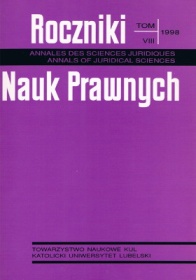The Concordat for the Free Town of Gdańsk?
Abstract
In the interwar period Gdansk was equally often discussed on the international scale as the capitals of the biggest countries of the world. The town was of particular importance in the first period after the First World War ended and before the Nazi aggression on Poland.
In the first - democratic (the years 1920-1933) - period the reason why the biggest empires of the world were interested in Gdansk was due to the debates at the peace conference in Paris as well as their practical application in politics. By virtue of the decisions of the Treaty of Versailles Gdansk and its neighbouring territories were joined to establish the Free Town. From the point of view of the international law the Free Town of Gdansk was not entirely sovereign. It became a territory on which the interests of two countries clashed. The Polish party tended to defend its rights to the town and both historical and economic reasons supported this tendency. Now Germans, who officially relinquished their rights to it, would used ethnographic and political arguments.
In the second period, the Nazi years (1933-1939), the town gained publicity, a fact which was closely bound with the genesis of the Second World War. Thai presence of Gdansk on the international arena connected with the so-called world policy which originated in Geneva, the latter being more and more helpless in face of the threat from German fascism. The policy of appeasement applied towards Gdansk by the most important empires in the forum of the League of the Nations, ie France and Great Britain, had come to grief. The Free Town became in the 1930s a kind of „Nazi outpost". It was here that a special experimental military training ground was formed to test the policy itself, its methods and the preparation of necessary staff. In such a climate and idea was born (relatively little known today) to regulate the status of the Catholic Church in the Free Town of Gdansk by means of the concordat. Obviously, each of the parties had decisively different intentions. Unfortunately, the Nazi authorities of the Gdansk senate were to blame that the concordat had not been reached.
Copyright (c) 1998 Roczniki Nauk Prawnych

This work is licensed under a Creative Commons Attribution-NonCommercial-NoDerivatives 4.0 International License.


